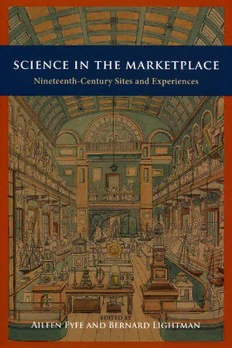
Science in the Marketplace: Nineteenth-Century Sites and Experiences PDF
Preview Science in the Marketplace: Nineteenth-Century Sites and Experiences
science in the marketplace G science in the marketplace Nineteenth-Century Sites and Experiences Edited by aileen fyfe & bernard lightman the university of chicago press chicago & london aileen fyfe is lecturer in the history of science at the National University of Ire- land, Galway, and author of Science and Salvation: Evangelicals and Popular Sci- ence Publishing in Victorian Britain. Bernard Lightman is professor of humani- ties at York University, Toronto, and author of The Origins of Agnosticism. The University of Chicago Press, Chicago 60637 The University of Chicago Press, Ltd., London © 2007 by The University of Chicago All rights reserved. Published 2007 Printed in the United States of America 16 15 14 13 12 11 10 09 08 07 1 2 3 4 5 isbn-13: 978-0-226-27650-2 (cloth) isbn-10: 0-226-27650-3 (cloth) Library of Congress Cataloging-in-Publication Data Science in the marketplace : nineteenth-century sites and experiences / edited by Aileen Fyfe and Bernard Lightman. p. cm. Includes index. isbn-13: 978-0-226-27650-2 (cloth : alk. paper) isbn-10: 0-226-27650-3 (cloth : alk. paper) 1. Science—Social aspects—Great Britain—History—19th century— Congresses. 2. Great Britain—Intellectual life—19th century—Congresses. 3. Science musuems—Great Britain—History—19th century—Congresses. I. Fyfe, Aileen. II. Lightman, Bernard V., 1950– q175.52.g7s355 2007 509.41’09034—dc22 2007000102 The paper used in this publication meets the minimum requirements of the American National Standard for Information Sciences—Permanence of Paper for Printed Library Materials, ansi z39.48–1992. G c o n t e n t s Acknowledgments vii Contributors ix 1. S cience in the Marketplace: An Introduction 1 Aileen Fyfe and Bernard Lightman Section I: Orality 2. H ow Scientifi c Conversation Became Shop Talk 23 James A. Secord 3. The Diffusion of Phrenology through Public Lecturing 60 John van Wyhe 4. L ecturing in the Spatial Economy of Science 97 Bernard Lightman Section II: Print 5. P ublishing “Popular Science” in Early Nineteenth-Century Britain 135 Jonathan R. Topham 6. S ensitive, Bashful, and Chaste? Articulating the Mimosa in Science 169 Ann B. Shteir 7. R eading Natural History at the British Museum and the Pictorial Museum 196 Aileen Fyfe v vi contents 8. I lluminating the Expert-Consumer Relationship in Domestic Electricity 231 Graeme Gooday Section III: Display 9. N atural History on Display: The Collection of Charles Waterton 271 Victoria Carroll 10. Science at the Crystal Focus of the World 301 Richard Bellon 11. “ More the Aspect of Magic than Anything Natural”: The Philosophy of Demonstration 336 Iwan Rhys Morus 12. T he Museum Affect: Visiting Collections of Anatomy and Natural History 371 Samuel J. M. M. Alberti Index 405 G a c k n o w l e d g m e n t s The editors would like to thank all the participants at the “Nineteenth-Century Popular Science: Sites and Experiences” conference held at York University, To- ronto, in Au gust 2004. We would particularly like to thank Jonathan Rose, Sophie Forgan, and Sofi a Åkerberg. We are grateful to Jim and Anne Secord for playing a key role in the conceptualization of the conference and volume at the very early stages. We would also like to express our appreciation to all the York University units which provided funding for that event: Bethune College, the Division of Humanities, the Office of the Dean of the Faculty of Arts, the Office of the Vice- President Academic, the Science and Technology Studies Program of the Atkin- son Faculty of Liberal and Professional Studies, and the Ad Hoc Research Fund. Aileen Fyfe would also like to acknowledge the support of the Irish Research Council for the Humanities and Social Sciences for providing teaching relief dur- ing the period when most of the editorial work on this volume was carried out. vii G c o n t r i b u t o r s Samuel J. M. M. Alberti is lecturer at the University of Manchester Centre for Museology and research fellow at the Manchester Museum. Trained as a historian of science, he has published on scientifi c cultures in Victorian Britain and on museums of anatomy and natural history. He currently is writing a history of the Manchester Museum and conducting a study of nineteenth-century pathology collections. Richard Bellon is visiting assistant professor in the Lyman Briggs School of Science at Michigan State University, where he teaches the history of sci- ence. His current research explores the history of nineteenth-century natu- ral history, particularly the relationship between botany and Darwinian theory in the mid-Victorian period. Victoria Carroll is curator of history of science at the Science Museum, Lon- don. She has recently completed a PhD on “Science and Eccentricity in Early Nineteenth-Century Britain.” Her research interests include the his- tory of natural history and geology, the history of collecting, and science and communication. Aileen Fyfe is lecturer in the history of science at the National University of Ireland, Galway. She is currently working on the role of the book trade in the provision and organization of knowledge in the mid-nineteenth cen- tury and is the author of Science and Salvation: Evangelicals and Popular Science Publishing in Victorian Britain (2004). Graeme Gooday is senior lecturer in history and philosophy of science at the University of Leeds. He is the author of The Morals of Measurement: Accu- racy, Irony, and Trust in Late Victorian Electrical Practice (2004) and editor (with Robert Fox) of Physics in Oxford 1839–1939: Laboratories, Learning, and College Life (2005). At present, he is completing a book on electricity, gender, and expertise in the late nineteenth century. ix
